Edward Groff Conklin was an American science fiction anthologist. He edited 40 anthologies of science fiction, one of mystery stories, wrote books on home improvement and was a freelance writer on scientific subjects as well as a published poet. From 1950 to 1955, he was the book critic for Galaxy Science Fiction.
The Thinker's Library was a series of 140 hardcover books published between 1929 and 1951 for the Rationalist Press Association by Watts & Co., London, a company founded by the brothers John and Charles Watts and then run by the latter's son Charles Albert Watts. The name was suggested by Archibald Robertson, a member of the company's board of directors, who took an active interest in setting up the series and was later to write several volumes himself. The Thinker’s Library was intended as a successor to the cheap paperback “Sixpenny Reprints” from the same publisher, the aim being to bring humanist, philosophical and scientific works to as wide an audience as possible. Unlike the previous series, the volumes in the Thinker’s Library were small hardbacks bound in brown clothette, with grey dustjackets, priced at one shilling. The covers of the early editions featured title, author’s name and a brief description of the book between Doric columns, with the image of Rodin’s The Thinker at the foot. The design would change several times over the course of the series, but the figure of the Thinker remained ever-present.
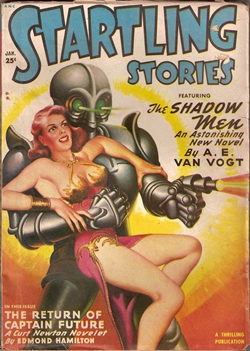
Startling Stories was an American pulp science fiction magazine, published from 1939 to 1955 by publisher Ned Pines' Standard Magazines. It was initially edited by Mort Weisinger, who was also the editor of Thrilling Wonder Stories, Standard's other science fiction title. Startling ran a lead novel in every issue; the first was The Black Flame by Stanley G. Weinbaum. When Standard Magazines acquired Thrilling Wonder in 1936, it also gained the rights to stories published in that magazine's predecessor, Wonder Stories, and selections from this early material were reprinted in Startling as "Hall of Fame" stories. Under Weisinger the magazine focused on younger readers and, when Weisinger was replaced by Oscar J. Friend in 1941, the magazine became even more juvenile in focus, with clichéd cover art and letters answered by a "Sergeant Saturn". Friend was replaced by Sam Merwin Jr. in 1945, and Merwin was able to improve the quality of the fiction substantially, publishing Arthur C. Clarke's Against the Fall of Night, and several other well-received stories.
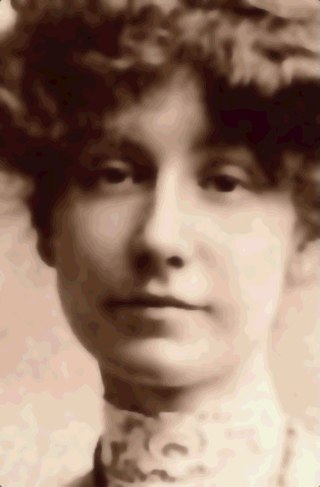
Margaret Gabrielle Vere Long, who used the pseudonyms Marjorie Bowen, George R. Preedy, Joseph Shearing, Robert Paye, John Winch, and Margaret Campbell or Mrs. Vere Campbell, was a British author who wrote historical romances and supernatural horror stories, as well as works of popular history and biography.
Jove Books, formerly known as Pyramid Books, is an American paperback and eBook publishing imprint, founded as an independent paperback house in 1949 by Almat Magazine Publishers. The company was sold to the Walter Reade Organization in the late 1960s. It was acquired in 1974 by Harcourt Brace which renamed it to Jove in 1977 and continued the line as an imprint. In 1979, they sold it to The Putnam Berkley Group, which is now part of the Penguin Group.
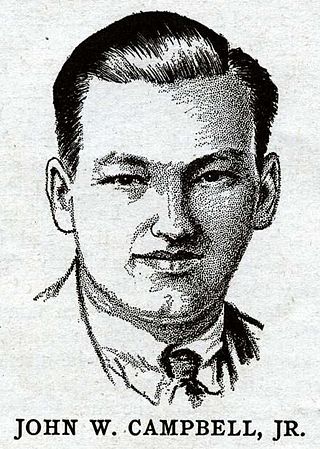
This is a bibliography of works by American writer John W. Campbell Jr.

Oscar Jerome Friend began his career primarily as a pulp fiction writer in various genres including horror, Westerns, science fiction, and detective fiction. As a pulp writer he worked with Wonder Stories, Startling Stories, Strange Stories, Captain Future and Thrilling Wonder Stories. As his career progressed, Oscar Friend authored many novels, which were published worldwide. Friend wrote screenplays, worked as an editor on periodicals, and was co-editor on several anthologies. Finally, he took the helm of a literary agency.

First Flight: Maiden Voyages in Space and Time is an anthology of science fiction short stories edited by Damon Knight, first published in paperback by Lancer Books in August 1963. It is a compilation of the first published stories of ten authors in the genre. It was reprinted in November 1966 and reissued as Now Begins Tomorrow in November 1969 by the same publisher. An expansion of the work, retaining Knight's introduction and adding the initial stories of ten additional authors, was later prepared by Martin H. Greenberg and Joseph D. Olander and published as First Voyages by Avon Books in May 1981.

The Science Fiction Hall of Fame, Volume Two is an English language science fiction two-volume anthology edited by Ben Bova and published in the U.S. by Doubleday in 1973, distinguished as volumes "Two A" and "Two B". In the U.K. they were published by Gollancz as Volume Two (1973) and Volume Three (1974). The original U.S. subtitle was The Greatest Science Fiction Novellas of All Time.

Imagination Unlimited is an anthology of science fiction short stories edited by Everett F. Bleiler and T. E. Dikty, first published in hardcover by Farrar, Straus & Young in 1952. As originally published, the anthology includes thirteen stories by various authors, with an introduction and four brief essays by the editors. In the UK The Bodley Head published the work as two separate anthologies in 1953, one, containing the first six stories, under the same title as the American edition and the other, containing the remaining seven stories, as Men of Space and Time. The anthology was also reprinted in an abridged paperback edition containing seven of the stories by Berkley Books in April, 1959. Only the original edition included the introduction and the essays.
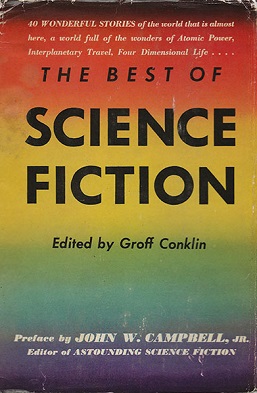
The Best of Science Fiction, published in 1946, is an anthology of science fiction anthologies edited by American critic and editor Groff Conklin.
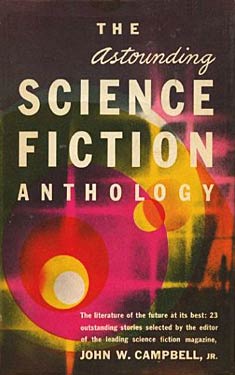
The Astounding Science Fiction Anthology is a selection of stories from Astounding Science Fiction, chosen by the magazine's longtime editor John W. Campbell Jr. It was originally published in hardcover in 1952 by Simon & Schuster, and reprinted in various forms and editions over the next two decades.

Science-Fiction Adventures in Dimension is an anthology of science fiction stories edited by Groff Conklin, first published by Vanguard Press in hardcover in 1953. An abridged edition was issued by Grayson & Grayson in the UK, and an abridged paperback edition, with a different selection of stories from the original, was issued by Berkley Books; both abridgments carried unhyphenated titles.

First Voyages is an anthology of science fiction short stories edited by Damon Knight, Martin H. Greenberg and Joseph D. Olander, first published in paperback by Avon Books in May 1981. It is a compilation of the first published stories of twenty prominent authors in the genre, and an expansion of Knight's earlier First Flight: Maiden Voyages in Space and Time, which covered ten of the same stories and authors.

"...and some were human." is the first story collection by science fiction writer Lester del Rey, originally published in hardcover by Prime Press in 1948 in an edition of 3,050 copies if which 50 were specially bound, slipcased and signed by the author. The stories first appeared in Astounding and Unknown. An abridged paperback edition, including only eight of the twelve stories, was issued by Ballantine Books in 1961. A Spanish translation, reportedly dropping only one story, appeared in 1957.

Captain Future was a science fiction pulp magazine launched in 1940 by Better Publications, and edited initially by Mort Weisinger. It featured the adventures of Captain Future, a super-scientist whose real name was Curt Newton, in every issue. All but two of the novels in the magazine were written by Edmond Hamilton; the other two were by Joseph Samachson. The magazine also published other stories that had nothing to do with the title character, including Fredric Brown's first science fiction sale, "Not Yet the End". Captain Future published unabashed space opera, and was, in the words of science fiction historian Mike Ashley, "perhaps the most juvenile" of the science fiction pulps to appear in the early years of World War II. Wartime paper shortages eventually led to the magazine's cancellation: the last issue was dated Spring 1944.

A Treasury of Science Fiction is an American anthology of science fiction short stories edited by Groff Conklin. It was first published in hardcover by Crown Publishers in 1948, and reprinted in March 1951. A later edition was issued by Bonanza Books/Crown Publishers in March 1980. An abridged paperback version including eight of its thirty stories was published by Berkley Books in July 1957 and reprinted in January 1958 and January 1965.

Possible Worlds of Science Fiction is an anthology of science fiction short stories edited by American anthologist Groff Conklin. It was first published in hardcover by Vanguard Press in 1951. An abridged hardback version including thirteen of its twenty-two stories was published by Grayson & Grayson in 1952; an abridged paperback version including ten of its twenty-two stories was published by Berkley Books in July 1955 and reprinted in April 1956, November 1960, January 1962 and November 1968.
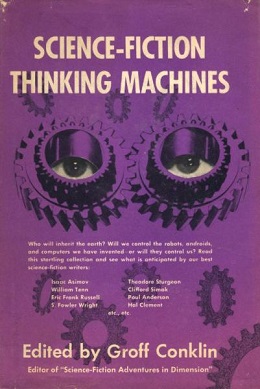
Science Fiction Thinking Machines: Robots, Androids, Computers is an anthology of science fiction short stories edited by American anthologist Groff Conklin. It was first published in hardcover by Vanguard Press in May 1954. An abridged paperback edition titled Selections from Science Fiction Thinking Machines was published by Bantam Books in August 1955 and reprinted in September 1964.
This is a list of the writings of the American writer August Derleth.
















